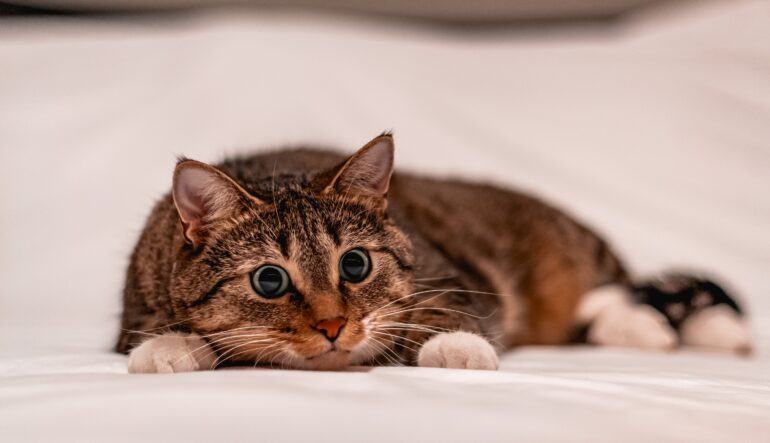Lucie Bonvalet
Once upon a time there was a physicist named Schrödinger who had a cat, and this cat was believed to be both alive and dead simultaneously. No one knew for sure how this belief originated nor how old the cat was. Was the cat born dead? Or did he grow from within his death while remaining alive? Three theories circulated and they did not contradict each other. But when juxtaposed, they helped Schrödinger’s neighbors to better understand the complicated dynamic between the scientist and the feline.
The cat was known to blep. He blepped mostly in his sleep and he could sleep for very long periods of time, more often during the day. Sometimes he dreamed and blepped and his eyes, slightly protruding outside of the furry orbits, would fix the ceiling. His long brown and grey fur remained warm to the touch and softly vibrated, but the fixed eyes and the floppy tongue misled the physicist into believing that perhaps half his cat inhabited the land of the dead, while the other half was shedding hair everywhere on his cushions.
The second point of dissonance in this interspecies ill-fated relationship came from the cat’s name: Eichhörnchen. Eichhörnchen, which means squirrel in Schrödinger’s native language, was a terrible name for a cat. This was a consensus between Schrödinger’s neighbors as well as between all the cats who lived nearby and who knew Eichhörnchen (because he slept all day long, but he had a very active night life and a reputation that had spread in the cat population surrounding Schrödinger’s house). Eichhörnchen is very difficult to pronounce for most cats, but also for a significant percentage of the human population. And for a cat as proud and haughty as Eichhörnchen, to be named squirrel can be a source of great exasperation and frustration. There are many points of conflict between the two species. Cats look down on squirrels because they never attempted to domesticate humans. Squirrels have a horror for human habitats and think it is repulsive to sleep in a human bed, it damages the spirit permanently. Everyone should sleep in trees. Or in underground tunnels if necessary. Schrödinger, for some reason, did not know those basic facts. He had chosen the name Eichhörnchen for his kitten because of the beautiful hue of his fur, burnt sienna, his slightly protruding eyes and his elegant bushy tail. But Eichhörnchen never responded to his name. He preferred to stay without food for days rather than to consent to turn his head when Schrödinger called him. The first years of their life together, Schrödinger thought that Eichhörnchen was deaf, but after they consulted several veterinarians and it appeared that nothing was wrong with the cat’s ears nor with his brain, then the physicist decided that perhaps the cat inhabited two worlds simultaneously and therefore could not be fully present in either of them.
At this point it is important to mention that Schrödinger loved his cat, deeply. He combed his fur every morning while he was asleep. He made sure to try new food with him regularly for fear he was bored, or that a lack of appetite could explain his lack of attention towards his environment. He created excellent cat’s nests with soft woolly blankets in different areas of the house according to the seasons: one near the stove between October and March, one perched by the large French window facing east all year long, one in the sunroom in the spring and one underneath the fig tree on Sunday afternoons in July and August. Eichhörnchen was grateful for the nests and slept in all of them willingly, but nothing could ever alleviate the pain caused by his name. Among cats, at night, he had another name that the oldest cat of the neighborhood had chosen for him: Mars. The very first syllable the kitten had pronounced without blepping. But also a name that spoke of wrath, lauded warriors, red planets. A name soothing for Eichhörnchen’s (perhaps slightly inflated) self-esteem. But the cat was an exceptional hunter and was universally feared in combat because, when still a kitten, he had pierced the eye of the big black cat that lived across the street from Schrödinger.
A third theory, and by far the most disqueting, to support the idea that Eichhörnchen was alive and dead at all times, is that Schrödinger sensed the presence of the cat most acutely when the cat was away. Perhaps it was a furry brown shadow registered at the corner of his left eye. Perhaps a weight on his chest, a warm weight, and the exact size of a cat, while he lay on his bed at night. Perhaps two twin green lights staring at him from the top of the stairs in his attic, as he was attempting to concentrate on a essay to write. All these phenomena took place while Eichhörnchen, far from the physicist’s house, was on his long nocturnal escapades. Eichhörnchen was never more disruptive and loud for the physicist than when he was absent. His ghost-like presence was so potent that Schrödinger concluded that only a dead soul could have so much power, porous control, over a living human.
Schrödinger adapted. He decided to create a new system of physics that would better accomodate the complex personality of his feline companion. To this day, it is difficult to know for sure if Eichhörnchen was happy with Schrödinger or whether he would have been better off as Mars, a feral cat. Schrödinger’s love was pure and sincere and no doubt Eichhörnchen felt it. Yet an ill-chosen name is a painful thing to bear and it can have unforeseen consequences in the universe.
What will happen on the day that Eichhörnchen decides to leave Schrödinger? How can the bond between them be severed? One possibility is that Eichhörnchen becomes Schrödinger’s shadow. Another is that without his cat, Schrödinger’s sense of reality erodes, his world shrinks, he forgets words, he loses interest in physics. Another option yet still is that because the cat was named twice, by two different species, and because he can also come and go among the living and the dead, chronology can not be applied, therefore, Schrödinger and Eichhörnchen perpetually dance and hover between worlds, mostly in a nocturnal state, together. Schrödinger gently calling, Eichhörnchen actively not hearing.
Lucie Bonvalet is a writer, a visual artist, and a teacher. Her writing (prose & poetry) can be found in SAND, Phantom Drift Limited, Juked, Jellyfish Review, Catapult, Puerto del Sol, 3AM, Hobart, Michigan Quarterly Review, and elsewhere. She completed her MFA in Creative Writing in Portland State University. Originally from the Dordogne in France, she lives in Portland, Oregon. Follow her on Twitter at @LucieBonvalet.



